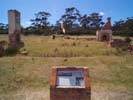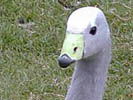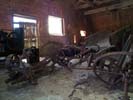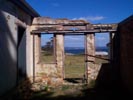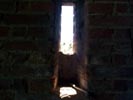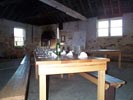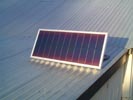|
|
heritage The aborigine above is Bara-ourou, who lived on Maria island in the early 1800's. Source (from Peron's journey): http://www.nma.gov.au/christensen/textimages/chri54.htm "...recent archaeological findings indicate that Aboriginal occupation [of Australia] dates back approximately 170,000 years. Aboriginal people, however, say We have always been here." Source: Tripcony, P (1996). To obvious to see: Aboriginal spirituality and cosmology. Available http://www.qut.edu.au/chan/oodgeroo/Spirituality.html. "The indigenous population, which had been on the island [Tasmania] some 35,000 years, numbered about 5,000 at the time of colonization; they were subsequently decimated." Source: Anonymous, (n.d.).Tasmania. Available: http://www.infoplease.com/ce6/world/A0847917.html January 3rd 2002. "Just over 2.6% of Tasmania's population was recognised as Aboriginal on the 1996 census." Source: Anonymous2, (n.d.). People of Tasmania. Available: http://www.tased.edu.au/tasfaq/people January 3rd 2002. ------ ian This community literally made up their culture as they went along. The women adopted European names, the community built Tahitian style canoes, the language was a blend of Tahitian and English. There was basically a race war after arriving on Pitcairn, and women made up most of the adult population within six years. In 1856, the entire Pitcairn community moved to Norfolk Island (some returned shortly after). The pervasive power of women is felt today on Norfolk Island. That women had the vote on Pitcairn was recorded in 1837. The use of intuition is important. Respect. The culture is not official, in the sense of making tapa or dancing traditionally, although music is a feature of the culture as is making good with what is at hand. The ukulele is ubiquitous. On Norfolk the Tamare is danced, but at parties rather than performances. My mother met my father by swimming into him at a beach on Norfolk (he was stationed there just after the war). Afterwards, they moved to New Zealand Aotearoa. jenny To Southerners I am a "Northerner" which has many connotations in itself: (vulgar, thick, provincial, heavy accent, working class). All not necessarily true of course! I suppose I was working class, and still feel it/hear it when I speak but due to reaching MA level of education perhaps this now makes me "middle class"? (I don't agree with this though.) I am white and have red hair, therefore I am an oddity within that larger group and that's been fairly consistent throughout (despite red hair being widely available as a "fashion colour" in the shops, Britain treats "ginger" as the last pisstake allowed in our "pc world" (also a chain of computer stores.) Oddly though, when in Edinburgh once, I felt so at home seeing more of my kind on the streets... ------ Today the island's main inhabitants are enthusiastic bushwalkers and a diversity of wildlife including the Forester kangaroo (an introduced species), Bennets and Rufous wallaby, Cape Barren geese, and a large number of migratory birds. The impact of settlement and industry has virtually disappeared from the island. Many of the convict buildings, as well as the ill-fated Grand Hotel, have been dismantled. In 1992 the Sydney Morning Herald travel writer Monique Farmer observed that: 'The 20th century has barely touched the island. The only vehicles belong to the rangers. There are no shops, few modern conveniences. Camping facilities are basic. There are no showers or hot water [this has now changed]. There are a few camping sites to choose from, or people can stay in the old prisoner's barracks, The Penitentiary. Each cabin contains bunks with mattresses and a wooden stove for heating. Source: http://www.walkabout.com.au/locations/TASMariaIsland.shtml#Things%20to%20see ian Thanks for considering the matter and investigating it. However, I’m also not in favour of petrol generators on the island. etienne And we will not actively chase up alternative power sources ............ since working with power restrictions is perhaps more in line with the spirit of Maria Island. That said ....... I still am expecting lots of callbacks from various people, and if something does come through, I'll post to the list that there is still an opportunity for alternative power sources.... see what the vibe is. ken In exchange ... booze, food, camera loans, smiles, mosquito repellent, etc. ------ Cape Barren goose photos on this site are courtesy of Robert Sussman. Source. ------
|


